Key Takeaways
- The average person spends about $3.3 million in their lifetime.
- Housing is the biggest expense, making up about 44% of lifetime spending.
- Transportation costs can add up to nearly $470,000 over a lifetime.
- Healthcare and insurance can cost around $290,000 throughout life.
- Lifestyle choices, like having children and education, significantly affect overall spending.
Understanding Lifetime Spending: A Personal Journey
Reflecting on Personal Spending Habits
As I think about my own spending, I realize how easy it is to overlook the little things that add up over time. Every dollar counts, and it’s surprising to see how my daily choices shape my financial future. For instance, I often grab a coffee on my way to work. While it seems harmless, those small purchases can lead to significant expenses over the years.The Emotional Impact of Spending
Spending isn’t just about numbers; it’s also about feelings. I’ve noticed that when I buy something I really want, it brings me joy. However, I also feel guilty when I splurge on things I don’t need. This emotional rollercoaster can make it hard to stick to a budget. I’ve learned that being mindful of my spending helps me feel more in control and less stressed about money.How Spending Shapes Our Lives
The way we spend our money can define our lives. For example, I’ve made choices about where to live and what to drive based on my budget. These decisions impact my daily life and future goals. I often think about how much I’ll spend on major life events, like buying a home or raising a family. Here’s a quick look at some average lifetime spending categories:| Category | Average Spending |
|---|---|
| Housing | $1,486,160 |
| Transportation | $470,000 |
| Healthcare | $290,016 |
| Education | $42,960 |
| Vacations | $118,000 |
Breaking Down the Major Expenses
When I think about how much money I spend in my lifetime, it’s a bit overwhelming. Housing is the biggest expense, making up about 24% of what I’ll spend overall. This includes not just the mortgage, but also utilities and furniture. Here’s a quick breakdown of some major expenses:The Cost of Housing Over a Lifetime
Housing costs can really add up. On average, I might spend around $1.5 million on housing throughout my life. This includes buying a home, paying for repairs, and all those little things that come with it. It’s a huge part of my budget, and I often wonder if I’m getting my money’s worth.Transportation: More Than Just Getting Around
Next up is transportation. I’ve realized that I’ll probably spend about $470,000 on cars over my lifetime. That’s a lot! I’ve had my fair share of cars, and it’s interesting to think about how much I’ve spent just to get from point A to point B. It’s not just the car payments; it’s also gas, insurance, and maintenance.Healthcare and Insurance Costs
Healthcare is another biggie. I expect to spend around $290,000 on health insurance and medical expenses. This number can vary a lot depending on my health and the insurance I choose. It’s a reminder that taking care of my health is not just about feeling good; it’s also about my wallet. Here’s a quick summary of these major expenses:| Expense Category | Estimated Lifetime Cost |
|---|---|
| Housing | $1,486,160 |
| Transportation | $470,000 |
| Healthcare | $290,016 |
The Impact of Lifestyle Choices on Spending
Family Planning and Child-Rearing Costs
When I think about family planning, I realize how much it can affect my spending. Having kids is a big decision, and it comes with a lot of costs. From diapers to daycare, the expenses can really add up. In fact, I’ve read that the average person spends around $467,220 on raising children over their lifetime. That’s a huge amount! It makes me think about how important it is to plan ahead.The True Cost of Education
Education is another area where I’ve noticed my spending can really change my life. I’ve spent a good chunk of my savings on my education, and I know many people do the same. The average lifetime spending on education is about $42,960. It’s a lot, but I believe it’s worth it. Investing in education can lead to better job opportunities and higher earnings in the long run.Balancing Leisure and Entertainment Expenses
Leisure activities are also a big part of my spending. I love going on vacations and enjoying time with friends. On average, people spend about $118,000 on vacations in their lifetime. I try to balance my fun with my budget, but it’s easy to get carried away. I’ve learned that it’s important to enjoy life while also being smart about my finances. In conclusion, my lifestyle choices have a significant impact on my spending. Whether it’s planning for a family, investing in education, or enjoying leisure activities, each decision shapes my financial future. Science shows that prioritizing time over money can lead to higher life satisfaction. So, I try to find a balance that works for me!Navigating Financial Milestones
Buying Your First Home
Buying my first home was a huge step. I remember feeling excited but also a bit scared. It’s a big financial commitment! I learned that the average American spends about $1.5 million on housing over their lifetime. This includes not just the mortgage but also utilities and renovations. Here’s a quick breakdown of what I found:| Expense Type | Average Cost |
|---|---|
| Mortgage | $1,486,160 |
| Renovations | $190,429 |
| Utilities | Varies |
Planning for Retirement
Retirement planning is something I wish I had started earlier. I learned that saving for retirement can feel overwhelming, but it’s essential. I aim to save at least 15% of my income. Here are some tips I follow:- Start saving early.
- Take advantage of employer matches.
- Consider different investment options.
Managing Unexpected Expenses
Unexpected expenses can really throw a wrench in your plans. I’ve had my share of surprises, like car repairs or medical bills. Having an emergency fund is crucial! I try to keep at least three to six months’ worth of expenses saved up. Here’s how I manage:- Set aside a small amount each month.
- Use a separate savings account for emergencies.
- Review and adjust my budget regularly.
Strategies to Manage Lifetime Expenses
Budgeting for the Long Haul
Managing money can feel overwhelming, but I’ve found that having a solid budget is key. I like to follow the 50/30/20 rule, which means I allocate 50% of my income to needs, 30% to wants, and 20% to savings. This simple breakdown helps me keep track of where my money goes and ensures I save for the future. Interestingly, some people also follow a variation called the 30/70 rule, which emphasizes saving or investing 70% of your income and living on the remaining 30%. This more aggressive savings strategy is especially useful for those aiming for early retirement or building wealth faster. Whether you want to generate pay stubs, stick with 50/30/20, or aim for 30/70, having a structured plan is key to managing lifetime expenses.Investing in Your Future
Investing might sound complicated, but it’s really about making your money work for you. I started small by putting money into a retirement account. Over time, I’ve seen how even a little can grow into a lot. It’s like planting a seed and watching it grow into a tree!Smart Saving Tips for Every Stage of Life
Saving money is important at every age. Here are some tips that have helped me:- Start early: The sooner you begin saving, the more you can accumulate over time.
- Set specific goals: Whether it’s for a vacation or a new car, having a goal makes saving easier.
- Cut unnecessary expenses: I’ve learned to identify what I really need versus what I want. This helps me save more.
The Role of Inflation and Economic Changes
How Inflation Affects Lifetime Spending
Inflation is something that affects all of us, whether we realize it or not. Over time, prices for goods and services tend to rise. This means that what I could buy for a dollar today might cost two dollars in the future. For example, I remember when a movie ticket was just $5. Now, it’s often around $12 or more! This increase in prices can make it hard to keep up with spending over a lifetime.Adapting to Economic Shifts
As I think about my own spending, I notice how economic changes can impact my budget. When the economy is doing well, I might feel more comfortable spending money on things like dining out or vacations. But during tough times, I find myself cutting back. Here are a few ways I adapt:- Reassessing my budget: I look at what I really need versus what I want.
- Finding deals: I search for discounts or sales to save money.
- Prioritizing savings: I try to set aside money for emergencies, just in case.
Future Predictions for Cost of Living
Looking ahead, I can’t help but wonder how much more I’ll need to spend in the future. If inflation continues, it’s likely that my expenses will increase significantly. For instance, if I think about my lifetime spending, I might end up spending millions! Here’s a simple breakdown of potential future costs:| Expense Category | Current Estimate | Future Estimate (in 20 years) |
|---|---|---|
| Housing | $800,000 | $1,200,000 |
| Transportation | $300,000 | $450,000 |
| Healthcare | $250,000 | $400,000 |
Personal Stories: Real-Life Spending Experiences
Lessons Learned from Financial Mistakes
I remember my first big financial mistake vividly. I was so excited to buy my first car. I thought I was making a smart choice by getting a brand-new model. But that decision cost me more than I expected. The monthly payments were high, and I didn’t account for insurance and maintenance. I learned that sometimes, buying new isn’t the best option. Now, I always consider used cars and do my research before making big purchases.Success Stories in Financial Planning
On the flip side, I have a friend who planned her finances carefully. She started saving for her house early, and it paid off. She bought her home without taking on too much debt. Her story inspires me to think ahead. Planning can really change your financial future. I’ve started budgeting and saving for my own goals, like travel and retirement.Everyday Tips from Real People
Here are some tips I’ve gathered from friends and family about spending wisely:- Track your expenses: Knowing where your money goes helps you make better choices.
- Set a budget: It’s easier to stick to your spending limits when you have a plan.
- Save for fun: Don’t forget to set aside money for things you enjoy, like vacations or hobbies.
Frequently Asked Questions
How much does the average person spend in their lifetime?
On average, a person spends about $3.3 million throughout their life.
What are the biggest expenses in a person’s life?
The largest expenses include housing, transportation, healthcare, and raising children.
How does inflation affect spending?
Inflation can make prices go up over time, which means you might spend more for the same things in the future.
What can I do to manage my spending better?
Creating a budget, saving regularly, and avoiding unnecessary purchases can help you manage your spending.
Do lifestyle choices really impact how much I spend?
Yes, choices like having children, where you live, and how often you travel can greatly affect your total spending.
Is it possible to save money for retirement while managing other expenses?
Absolutely! Planning and budgeting can help you save for retirement while still covering your daily costs.







